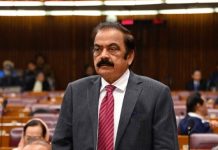ISLAMABAD: The Supreme Court (SC) of Pakistan’s Constitutional Bench on Thursday dismissed a set of petitions challenging the SC Practice Procedure Ordinance, ruling that it has already lapsed after enactment of the law, media reported.
The Constitutional Bench headed by Justice Aminuddin Khan ruled that the Parliament has enacted laws regarding practice procedures and the ordinance stood lapsed.
Justice Jamal Khan Mandokhail remarked that the ordinance would automatically lapse with the enactment of the law. Justice Muhammad Ali Mazhar noted that Parliament has enacted laws regarding practice procedures after the ordinance.
The petitions were filed by Chairman Pakistan Tehreek-e-Insaf (PTI) Barrister Gohar, Afrasiab Khattak, Ihtisham Haq, and Akmal Bari, among others.
Justice Muhammad Ali Mazhar added that the committee formed under the ordinance has ceased to exist but its decisions are protected.
Regarding the President of Pakistan’s authority to issue ordinances, Justice Mandokhail pointed out that the Constitution grants the President this power.
Earlier, the PTI chairman challenged the presidential Ordinance, seeking to declare it unconstitutional.
The petition sought to restrain the formation of a new Practice and Procedure Committee until the petition is heard and requested that the old committee be allowed to function during the hearing of the petition.
Additionally, the federal government, law ministry, and secretary to the president were made respondents in the petition.
On the other hand, Supreme Court Justice Jamal Khan Mandokhail on Thursday questioned the legitimacy of trying civilians under the armed forces’ disciplinary framework, during the hearing of intra-court ap-peals against military courts’ decisions.
The seven-member constitutional bench, led by Justice Aminuddin Khan, heard the appeals. The bench also included Justice Mandokhail, Justice Muhammad Ali Mazhar, Justice Syed Hasan Azhar Rizvi, Justice Naeem Akhtar Afghan, Justice Musarrat Hilali and Justice Shahid Bilal Hassan.
Representing the federal government, senior lawyer Khawaja Haris argued that the cases revolve around Article 8 of the Constitution.
However, Justice Mandokhail raised critical questions, including: “How can an individual not a part of the armed forces fall under its disciplinary code?” He elaborated by comparing it to departmental codes, saying: “If someone works in agriculture, they are subject to its discipline, but how does armed forces’ discipline apply to a civilian? ” –Agencies






